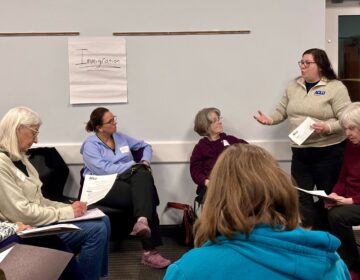N.J. citizen groups, activists upset at government’s ‘failure’ to protect immigrants, transgender and disabled people
They want the Democratic governor, Senate president and Assembly speaker to pass bills to protect the state’s most vulnerable populations.
Listen 1:09
New Jersey Gov. Phil Murphy meets with Senate President Nicholas Scutari, right, and Assembly Speaker Craig Coughlin, second right, before he delivers his State of the State address to a joint session of the Legislature at the statehouse, in Trenton, N.J., Tuesday, Jan. 10, 2023. (AP Photo/Matt Rourke, File)
From Philly and the Pa. suburbs to South Jersey and Delaware, what would you like WHYY News to cover? Let us know!
Citizen and advocacy groups in New Jersey say they are frustrated by the Democratic legislature’s inaction to protect the state’s vulnerable populations.
Louise Walpin, co-leader of WADEIn New Jersey, said there has been a “blue trifecta of failure” because Democratic Gov. Phil Murphy, Democratic state Senate President Nick Scutari and Democratic Assembly Speaker Craig Coughlin have collectively failed to enact laws shielding the state’s immigrant, transgender and disabled communities from the “White House’s draconian policies.”
“It’s time to stand up like other states have, like California has, like Illinois has,” she said.
She said Garden State residents have been harmed by the ongoing U.S. Immigration and Customs Enforcement raids, President Donald Trump’s directive to cancel gender affirming care for transgender federal employees and White House policies denying disabled people access to needed care.
The three stalled bills
The Immigrant Trust Act, first introduced one year ago, aspired to codify protections currently in place through the Immigrant Trust Directive, a set of rules that limits how much local and state law enforcement officials can cooperate with federal immigration officials. The directive may be revoked, depending upon who the next governor is.
After it was formally introduced, the Immigrant Trust Act was referred to the Senate Judiciary Committee and the Assembly Oversight, Reform and Federal Relations Committee, but hearings have not been scheduled in either house.
In June 2024, a bill was introduced to codify protections for necessary healthcare for transgender patients and their providers. It was referred to the Senate Health, Human Services and Senior Citizens Committee, and the Assembly Health Committee, but hearings have not been scheduled in either house.
Last October, legislation to help those with developmental disabilities was introduced in the Assembly. It was referred to the Aging and Human Services Committee, but no hearing has been scheduled, and the measure has not been assigned to a committee yet in the Senate.
Walpin said it’s disturbing that all of these bills have stalled in Trenton.
“Our legislature and our governor are not exercising the power that they do have to protect the most vulnerable among us,” she said. “We need to do this before the election because we do not know for sure whether we will still have a blue trifecta come the election.”
Spokespersons for Murphy and Coughlin declined to comment on pending legislation. Scutari’s office did not immediately respond.
A long and winding road
Ben Dworkin, director of the Rowan University Institute for Public Policy and Citizenship, said it’s not surprising that there has not been movement on these bills because the legislative process is frequently long and complicated.
“There’s some 10,000 bills that are introduced in the New Jersey Legislature each year, and first they have to go to a committee. If it spends money, it goes to an additional committee,” he said.
He said a variety of factors may be considered before a bill can move forward, and that can take weeks or months.
“The Senate president and the Assembly speaker, the two top ranking officials in each body, have the authority to either post or not post the bill,” Dworkin said.
He added that some measures must be considered by two committees, then the bill may have amendments and need to be revisited. Legislation that is passed in committee may also be frozen by the Senate president or Assembly speaker for strategic reasons.
If a bill makes it to the full Senate or the Assembly, it must pass by a majority vote, and the process must be repeated by the other house. He said different issues may be raised in one house that were not considered controversial in the other, and those must be ironed out.
After both the Senate and Assembly pass a measure, it’s sent to the governor for consideration. The governor may sign the measure into law or he can ignore it, or he may conditionally veto it and send it back to lawmakers for one or more changes in language or policy, which can take even more time.
A question of priorities?
Walpin rejects the notion that getting things done legislatively in New Jersey has to be a long, complicated process.
She said when legislators wanted to raise their own salaries from $49,000 to $82,000 last year, a bill was introduced and passed in two weeks.
“When it comes to passing bills that benefit minority citizens,” she said, “then all of a sudden there’s an outcry that these [bills] are controversial and they just can’t possibly pass it.”
Maura Collinsgru, the director of policy and advocacy for New Jersey Citizen Action, agreed that state leaders are not doing enough.
“You know we have people taking to the streets to protect their loved ones, who are being unfairly and inhumanely rounded up, discriminated against, and people are having their health benefits and more cut and taken from them,” she said. “We really need elected leaders to stand up with us and speak out, and engage more directly in the fight.”
Dworkin said the job of legislators is to respond to the voters, but there are different constituencies that have many different agendas.
“The New Jersey Legislature can move quickly when it absolutely has to, but other than that, no, they tend to go pretty slow,” Dworkin said. “While any number of different groups will be advocating on behalf of their worthy causes it doesn’t mean that the legislature will move.”
He said politicians usually want to make sure the public is behind the actions they take.
“They want to make sure they don’t get too far ahead, because that’s when you stop being in the majority,” he said.
Collinsgru commended New Jersey Attorney General Matt Platkin for initiating or joining 33 lawsuits against the Trump administration since Trump was sworn into office in January.
WHYY is your source for fact-based, in-depth journalism and information. As a nonprofit organization, we rely on financial support from readers like you. Please give today.







